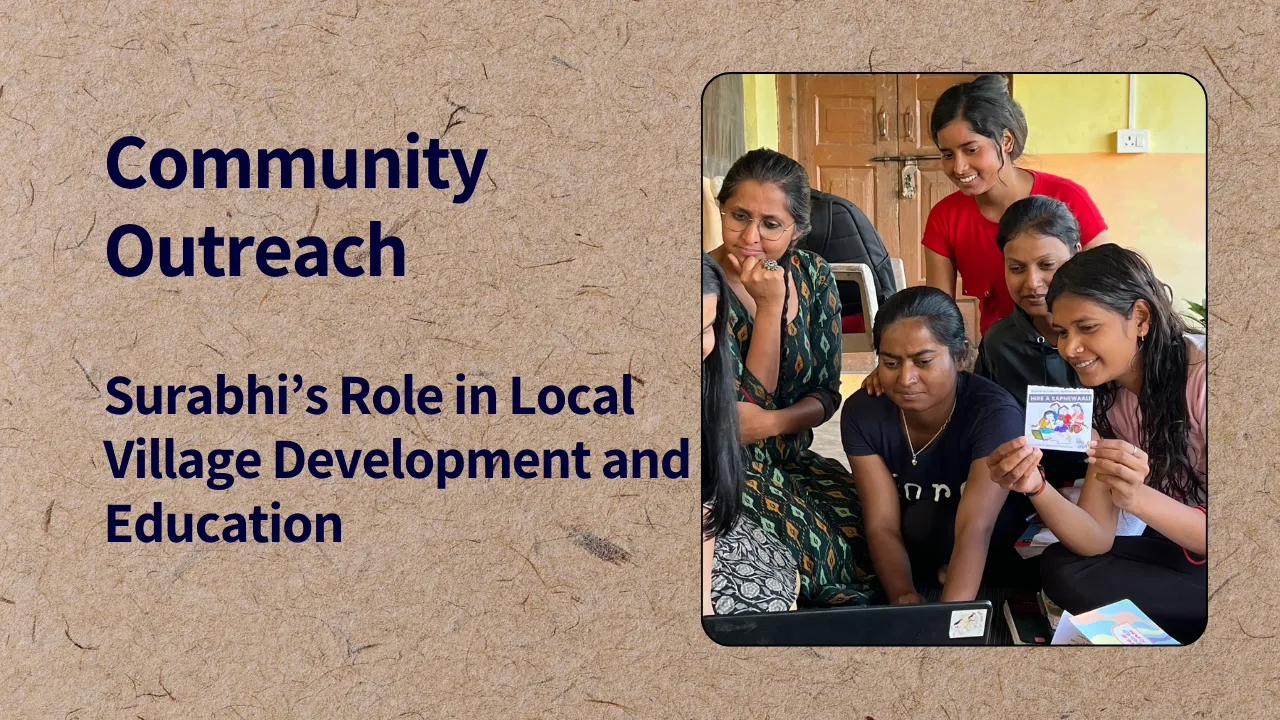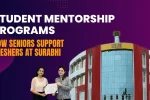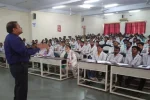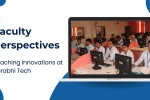Community Outreach at Surabhi: Community Outreach at Surabhi Institute isn’t just an optional activity—it’s a way of life. Students and faculty venture into nearby villages with passion, expertise, and empathy. Their shared goal is clear: uplift rural communities through meaningful projects in education, infrastructure, and social welfare. Hands-on action replaces theory, forging real bonds and delivering measurable change.
This article highlights how Surabhi’s outreach initiatives—ranging from literacy modules to water harvesting systems—are reshaping village education and quality of life. You’ll learn how digital literacy, teacher training, health awareness, and community partnerships come together as part of a long-term, sustainable rural development strategy.
Community Outreach at Surabhi: A 100–120 Word Spotlight
Community Outreach at Surabhi weaves student energy and faculty experience into village upliftment programs. Teams deliver literacy classes, digital literacy workshops, and teacher training in rural schools. Engineering students build rainwater harvesting structures and sanitation units. Health camps address hygiene and nutrition, while cultural exchange events strengthen trust. Projects use participatory methods, involving villagers in every step—from planning to maintenance. Surabhi’s interdisciplinary approach ensures education, infrastructure, and social development go hand in hand. What emerges isn’t charity—it’s a partnership that empowers villagers and shapes socially aware graduates ready to drive change. Beauty lies in mutual learning and sustainable impact.
Overview of Surabhi’s Local Outreach
| Activity | Beneficiaries | Tools & Methods |
| Literacy and tutoring programs | School-age children | Games, picture books, storytelling |
| Computer literacy workshops | Teens and adults | Laptops, Microsoft Office, internet basics |
| Health & hygiene awareness camps | Families and women | Skits, medical demos, hygiene talks |
| Rainwater harvesting & sanitation | Entire village | Civil/Mechanical design, local materials |
| Teacher training workshops | Rural school educators | Interactive pedagogy, classroom demos |
| Student-designed educational kits | Teachers and young learners | Science kits, storytelling boards |
| Cultural exchange events | Entire village | Folk music, dance, shared meals |
Literacy and Tutoring Programs
Surabhi students run weekend literacy classes in village schools. They teach reading, writing, and basic math using fun activities. Flashcards, storytelling, drawing, and group games keep children excited and learning. Faculty mentors oversee content and ensure teaching matches grade standards. Over time, students show clear progress—and newfound confidence in their own voice. This focus on literacy helps pave the way for ongoing education.
Computer Literacy Workshops
Digital literacy is key to modern opportunity. Surabhi teams bring portable computer labs to local classrooms. They teach basic computing: creating documents, browsing, emailing, and typing. Sessions are hands-on, with lot of practice time. They follow up with participants through WhatsApp groups and refresher camps. Mrs. Patel, a participant, said, “I can now email my daughter’s resume!”—a testament to the program’s impact.
Health and Hygiene Awareness Camps
Health talks and hygiene camps are held every semester. They include interactive drama, hygiene skits, tooth-brushing demos, and menstrual health discussions. Students and visiting medical professionals conduct basic check-ups—blood pressure, BMI, general advice. The aim is to improve community habits around sanitation, nutrition, and women’s health. Some villagers have since installed hand-washing stations at home—small changes, big impact.
Rainwater Harvesting & Sanitation Projects
Surabhi’s engineers design low-cost rainwater harvesting structures and sanitation units. Students calculate water needs, survey site locations, and build small reservoirs. Civil and mechanical engineering learners lead construction under faculty supervision. Villagers help build and maintain—ensuring shared responsibility. Once finished, systems are turned over with maintenance training. The result: improved water availability and better hygiene for hundreds.
Teacher Training Workshops
Surabhi brings modern pedagogy to rural classrooms. Faculty and education-inclined students introduce interactive teaching tools, game-based learning, and classroom management techniques. Teachers practice new methods during role-plays and micro-teaching sessions. Follow-up visits and peer-support groups ensure that methods are adopted long-term. Enrollment rates have increased and student attentiveness has noticeably improved.
Student‑Designed Educational Kits
Surabhi students develop simple, low-cost kits—such as science experiment sets and interactive charts. They use salvaged materials, local themes, and simple mechanics. These kits are tested on small groups before being distributed to schools. Teachers appreciate the tactile learning options, and learners enjoy visual, hands-on activities.
Cultural Exchange Events
Once or twice a year, Surabhi hosts festivals that blend campus and village life. Local residents and students share folk songs, dances, storytelling, and traditional food. Cultural exchange strengthens bonds and mutual understanding. It helps students root their outreach in respect for rural heritage and reminds villagers that they are equal partners in progress.
Monitoring, Feedback, Sustainability
Surabhi ensures every program is tracked. Attendance logs, surveys, and interviews help assess impact. Village committees participate in planning and maintenance. For example, computer labs installed receive local volunteer support. Teacher-training workshops come with peer mentorship networks in villages. Projects are set up to last and grow, not just show temporary success.
Faculty Mentorship and Interdisciplinary Support
Faculty across disciplines—education, engineering, health—lead and support outreach projects. Civil faculty help build sanitation systems. Education department guides school training. Health science experts run hygiene camps. Collaboration ensures each project is relevant, safe, and grounded in best practices. Student teams get guidance from multiple angles.
Two Highlighted Outreach Integration Areas
- Education + Digital Literacy
Connecting literacy programs with computer skills, students support academic growth and improve villagers’ access to technology. - Infrastructure + Health Awareness
Rainwater harvesting and sanitation work support hygiene awareness campaigns—creating healthier environments in villages.
FAQs
1. Who funds these outreach projects?
Funding comes from Surabhi’s outreach budget, student-led fundraising events, and occasional industry grants or CSR partnerships.
2. Can villagers sustain these programs after students leave?
Yes. Local volunteer training, village committees, and teacher engagement ensure programs continue and adapt after hands-on support ends.
3. How are education and digital workshops monitored?
Through attendance records, post-session quizzes, project submissions, and regular follow-ups with participating schools and villagers.
4. Do students receive academic credit?
Absolutely. Many programs offer service-learning credits and count toward co-curricular requirements, while standout leaders can earn awards or internships.
5. Can outsiders join outreach efforts?
Yes! Alumni, professionals, and volunteers are welcome. Contact Surabhi’s Outreach Office to join mentoring sessions, donate kits, or participate in events.
Final Thought
Surabhi’s Community Outreach initiatives embody a deeper vision of education—a vision that includes compassion, cooperation, and real-world problem solving. Whether through literacy classes or building rainwater systems, students and faculty create sustainable change. If this inspires you, take action: volunteer, donate materials, or share this story. Let’s strengthen rural communities together—join Surabhi’s mission today!






